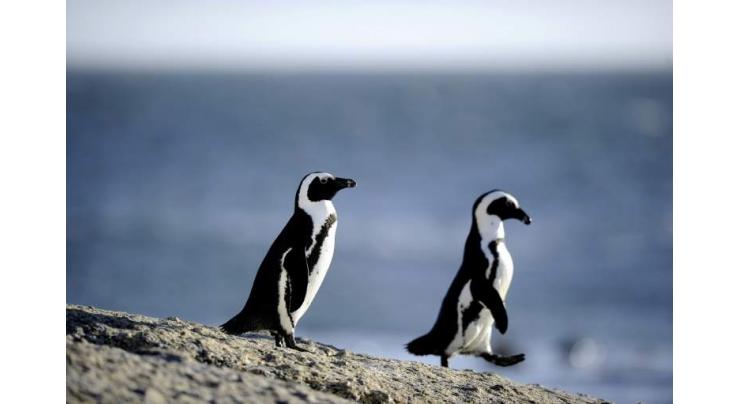
Refuelling Under Scrutiny As S.Africa Penguins Hit By Oil Spill
Muhammad Irfan Published July 10, 2019 | 02:41 PM

Rangers in wet suits have been searching for oil-tarred penguins in shallow water around St Croix Island off the South African coast as a refuelling spill highlights conservationists' fears over pollution
St Croix Island, South Africa, (APP - UrduPoint / Pakistan Point News - 10th Jul, 2019 ) :Rangers in wet suits have been searching for oil-tarred penguins in shallow water around St Croix Island off the South African coast as a refuelling spill highlights conservationists' fears over pollution.
Experts said an unknown number of penguins had been affected on the rocky, uninhabited island, which is home to the largest breeding colony of endangered African penguins in the world.
A Liberian-flagged ship spewed between 200 and 400 litres of oil into the sea off Port Elizabeth city during "bunkering" re-fuelling -- the process of filling a ship with fuel from another vessel.
The small-scale leakage from the bulk carrier MV Chrysanthi vessel at dawn on Saturday was the second oil spill in the environmentally-sensitive area in three years.
"This is exactly the concern with offshore 'bunkering' that we have been voicing concerns about," Stacey Webb, of the Southern African Foundation for the Conservation of Coastal Birds (SANCCOB) charity, told AFP.
"The danger is not over yet. Penguins forage up to 100 kilometres (60 miles) away from the islands (St Croix Island and Bird Island) so they could run into the spill out at sea." About 20 penguins covered in black sludge have been rescued by national parks rangers so far.
The weekend spill follows one in August 2016 when about 100 birds were affected by a smaller "bunkering" spill.
"Bunkering" only started in Ngqura port, part of Algoa Bay, in 2016, with the shipping industry promoting it as an economic boost for the area.
Plans to develop the bay into a major re-fuelling hub for international vessels have generated widespread controversy, with conservationists and the tourism sector saying the risk of pollution is too high.
Recent Stories

IHC issues notices to respondents in campaign against judges cases

Amazonian chief at UN to combat traditional knowledge piracy

Farewell ceremony for outgoing SP Saddar

2 officials of SFA arrested for extorting bribe

NCHR creates awareness of Human Rights through movies, short documentaries

Azma says no justification for demand to shift PTI chairman, wife to KP

Food Department rebuttal news of procuring wheat from blue-eyed middlemen

Nearly 450,000 Gazans now uprooted from Rafah amid relentless Israeli bombardmen ..

RCCI to host 16th All Pakistan Chambers Presidents’ Conference

DLE, CCP sign MoU for raising awareness among law students, lawyers

Finance minister meets PBC delegation

Canadian firm to invest US$ 50m in KP mineral sector
More Stories From World
-

Amazonian chief at UN to combat traditional knowledge piracy
28 minutes ago -

Nearly 450,000 Gazans now uprooted from Rafah amid relentless Israeli bombardment
39 minutes ago -

Record 76mn people displaced worldwide, says monitor
2 hours ago -

Michael Cohen to face defense grilling at Trump trial
4 hours ago -

Two French prison officers killed in inmate's escape
3 hours ago -

Three French prison officers killed
5 hours ago
-

UN says informed Israel of vehicle fatally hit in Gaza
5 hours ago -
Transfers, postings banned in WASA
6 hours ago -
UK summons Chinese envoy over 'interference', espionage
6 hours ago -
Fistfights in Georgian parliament as 'foreign influence' bill looms
7 hours ago -
Swiss nursery lets robot do the talking
7 hours ago -
Top UN court to hold hearings on Rafah offensive this week
7 hours ago






